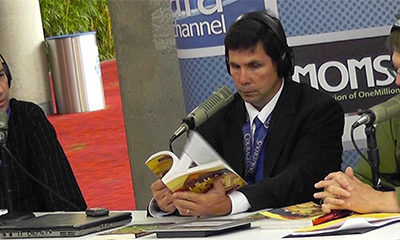As this blog post makes its way to the light of day, I’m in St. Louis at the annual convention of Christian booksellers. I’m scheduled for some media interviews along with meetings with my editors and my agent. There’s a lot of Q&A that goes on there. For those wondering what some of that Q&A is like. Here’s a sample.
You started out as a newspaper reporter. Did you ever regret making the jump to Christian writing?
Yes.
Sometimes I’ve felt like I was singing to the choir—just another Christian writer making pecking sounds on a keyboard for the enlightenment of the enlightened. At times I wonder if I could have been more helpful as a Christian working in a secular newsroom.
I don’t know.
What I do know is that I love what I’m doing. I get up each morning looking forward to the day’s work—well, most mornings.
It’s reassuring, too, when I hear from folks who are new to the faith or who are exploring Christianity and the Bible, and they tell me that one of my books is helping them.
This much I believe, wherever I go and whatever I do, God goes with me. It’s not as though the newspaper was my best option and Christian writing was second best. God is with me wherever I go and whatever I do. And I don’t see how that can be second best.
You don’t usually take a position in your books—especially on controversial topics. That’s unusual among Christian writers. Why don’t you let your readers know where you stand?
In the not-too-distant past I had a book project cancelled for that very reason—because I refused to take a position on a controversial topic. I had already written the book, on assignment, and with my non-position clearly expressed in the samples I submitted. But the publisher had second thoughts. And I wouldn’t budge. We both felt strongly about the matter. They lost the advance they paid me. And I lost the book deal with them—and any potential deals in the future. Fortunately for me, another publisher picked up the book.
There are two main reasons I avoid taking a position on topics that can go any number of ways when the Bible isn’t clear on the matter. Or worse, when the Bible is silent.
1. I’m an old-school news journalist, taught to report the facts as objectively as I can. And I am absolutely fed up to my ears with today’s journalists reporting the news and then telling me what they think about it. I don’t give a rat’s rear end what they think about it. I want to hear the facts objectively so I can make up my own mind.
I think that’s what many non-Christians and new Christians want when it comes to matters of faith. They want to know what the Bible says and how different scholars interpret it. Then they want to draw their own conclusions.
2. On many controversial issues, I don’t have an opinion. If the Bible doesn’t talk about it—and there’s a lot the Bible skips—I’m relaxed about saying, “I don’t know, but in God I trust.”
Here’s what I think about those tough topics that the Bible doesn’t bother giving a boo-hoo or how do you do. When the Bible is silent, I expect God’s Spirit to fill in the gaps.
Jesus told his followers that God would send the Spirit as a Counselor. In moments of crisis, when I have a big decision to make about something the Bible doesn’t address, I don’t plan on making my decision based on some of the brainwashing I’ve experienced in sermons—or on passionate opinions from other well-intentioned people who don’t have a biblical leg to stand on. I expect God himself to guide me.


I am so proud of you, Friend Steve, that you can so clearly and concisely give your thoughts in the various media. Truly God is with you and in you!
P.S. and to think, you did that all without the helo of Buddy the Dog! Sell lots of books so you can continue to keep him in the way he would like to be accustomed!
😉